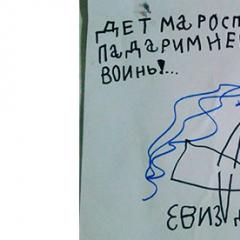Tests in German movie perfect. Perfect - the time has passed for German - German language online - Start Deutsch. Vіdminyuvannya dієslіv u pluperfektі
Perfect (das Perfekt) - a folding hour that has passed. And again, there is a trace of subtext that the perfect gets used to movement, or in texts that imitate movement. And also the perfect is necessary there, desperation about the past was revealed by the form of the day - ale about the divas. distributed “Uzgodzhennya chasiv”).
Perfect: dopomіzhne diєslovo haben - mother or sein - buti at the given hour + communion II the main dialect. About the selection of an additional div. lower, but more of the word haben.
The words machen and schreiben satisfy the perfect with the word haben, and kommen and fahren - with the word sein. Remember: u Russian ruhu satisfy the perfect with the additional German word sein.
We formulate these rules in a slur.
Perfect (as well as pluperfect) with the word haben
- Mustache(tobto dієslova z dopovnennyam znakhіdny vіdmіnku) - for example, machen - robustness, schreiben- write, lesen- read, wissen- nobility(and all modal words), anrufen- telephone and etc.
- Diezlova s sich- for example, sich waschen - mitigate, mitigate, sich anziehen- dress up, sich freuen- radio and etc.
- More intransitive diesels, yakі not є є єєslovom rush or change I will become - for example, stehen - stand, sitzen- sit, liegen- lie down, schlafen sleep and etc.
- Himself the word haben. Ale oskіlki construction їх habe gehabt, du hast gehabt and so on. looking cumbersome, then both in the language and in the written language the preterit of the word haben gets used: їх hatte, du hattest and so on.
In this order, the main respect for the following is not in the words, which make the perfect z haben (greater), but in the words, which make the perfect z sein.
Perfect (plus-perfect) with the word sein
- Dieslova ruhu chi change I will become-gehen- go, kommen- come, fahren- їhati, flygen- fly, fly, einschlafen- zashinati, aufstehen- get up, sterben- die and etc.
- Dieslova sein- buti, werden - stand up, bleiben - get rid of, begegnen(+D.)- zustrіchatisya, Geschehen - tremble, passieren - trapletsya, vіdbuvatisya, foil - catch up.
Dієslova, scho utveryut perfect z sein, secure in dictionaries last (s)- for example, fliegen (s) - fly, fly, pasieren (s) - trapletsya, vіdbuvatisya.
The additional verbal participle II creates a frame construction in the sentence:
- Du hast alles gemacht.
- Du hast alles gut gemacht.
- Du hast alles sehr gut gemacht.
The frame construction is saved and in nutrition:
- hast du diese Übungen schon gemacht? - Are you right already zrobiv qi?
- Bist du mit dem bus gefahren? - Did you come by bus?
- Wo haben Sie zu Mittag gegessen? - Did you offend?
The bar “nicht” is placed in front of the applier II (like in front of the prikmetnik):
- Ich habe das Wort nothing verstanden. - I don't understand that word.
- Erist night nothing gekommen. - Wine has not arrived yet.
Sometimes they ask: why do they live the perfect in the moment? It's easy to say: ich habe gemacht I am timid / timid, ich habe geschrieben - I have written / have written, ich habe mich gefreut - I was quiet ix bin gefahren - I їhav / arrived, ix bin aufgestanden - I got up, lower: ich machte, ich schrieb, ich freute mich, ich fuhr, ich stand auf? Well, in some German dialects, the preterite is used in language, but the universal norm is the perfect. Obviously, "shorter" does not mean "easier". Possibly, today it is easier for them to vicorate the standard “habe/bin” together with the indispensable variant II.
Ein Beamter kommt in Zoogeschäft und will einen Goldfisch zurückgeben.
Verkaufer: - Warum wollen sie das Tier nicht mehr haben? Ist der Fisch krank geworden?
Beamter: - Ні, ні, der hat uns nur zuviel Hektik in Büro gebracht!The official comes to the pet store and wants to turn the gold fish.
Seller: - Why don't you want to trim your creature? Is the fish sick?
Official: - No, she just made too much noise in our office!
Rozmov's movie has the form of the 1st letter. one hour habe often short before hab':
- Ich hab'schon gesagt. - I already said).
- Ja, ja, ich hab'gesehen. - So-so, I'm bachiv (-la).
- Ich hab' den Schlüssel mitgenommen. - I took the key with me.
Otzhe, whether it be our dream of a dream about the past, may take shape in the perfect:
- Ich habe alles gemacht. - I screwed everything up.)
- Meinen Pass habe ich schon gezeigt. - I already showed my passport.
- Ich habe meinen Koffer im Zimmer gelassen. - I left my bag in the room.
- Ich habe ein interesantes Buch gelesen. - I read (read) the book.
- You will be dort studiert. - I started there.
- Hast du mich angerufen? - Did you call me?
- Haben Sie meinen Freund gesehen? - You bachiv my friend?
- Er hat mir davon gesagt. - Vіn having told me about tse.
I smut - ich bin gewesen!
- Їx bin in Berlin gewesen. - I'm at Berlin.
- Nein, da bin ich noch nicht gewesen. - No, I'm not there yet.
- Wo bist du gewesen? - De ti buv(-a)?
Was, du hast ein neues Auto? Wie hast du dir denn das finanziert?
- Ganz einfach! Їx maє meine Stereoanlage in Zahlung gegeben.
- Und die hat der Mann ohne weiteres für das Auto genommen?
- Aber naturlich, er wohnt ja direkt unter uns!How do you have a new car? Did you get pennies from the stars?
- It's easy! I opened my stereo system.
- And that person without roses took її for the car?
- Well, obviously, you live right under us!
Perfect is called in the German language the past hour. Russian my wines are shifted by sounding in a diesel past hour like a thorough, and incomplete image.
Perfect in German language gets used most often in roman language, dialosis:
"Hast du dich zu den Prüfungen vorbereitet?" "Ja, їх bude schon alles wiederholt." - "Are you ready to drink?" "So, I already repeated everything."
Perfect in German language is also used in short notes:
Dieses Werk hat eine neue Art der Rechenautomaten entwickelt. - This plant has developed a new type of counting machines.
Perfect vikoristovuetsya for the expression of the past hour at different times of the day, then at a slump, if the day has passed before the next day, which happens at the given hour. Die word, which designates a day at a given hour, call to stand in Präsens:
Sie hat dieses Buch schon durchgelesen und jetzt gibt sie es mir zurück. - Vaughn has already read this book and now turn it over to me.
Perfect dієslіv haben, sein, as well as modal windows modern German language is often replaced by Präteritum:
Deputy: Wir haben am Mittwoch eine Versammlung gehabt (Perfekt) Vikoristovuetsya: Wir hatten am Mittwoch eine Versammlung. - At the middle of mi small pick.
Deputy: In diesem Museum bin ich schon mehrmals gewesen (Perfekt) Vikoristovuetsya: In diem Museum war їх schon mehrmals. - At this museum, I've already had a few times.
Perfect in German language folding shape the past hour, to settle for the help of additional dialects haben or sein in Präsens and participle II (3rd main form) of the dialect that conjugates.
Individual | With an additional idiomhaben | With an additional idiom sein |
ich | habe gelesen | bin gefahren |
du | hast gelesen | bist gefahren |
er | hat gelesen | ist gefahren |
wir | habengelesen | sindgefahren |
ihr | habt gelesen | seid gefahren |
sie | habengelesen | sindgefahren |
When illuminating Perfect, the main colloquialism is influenced by the choice of an additional dialect. If so, follow the following rules:
all non-transitional words, which mean transferring in space, otherwise I will change, transitioning to a new phase of the process, make Perfect for the help of the word sein
Dieslova seinі bleibenalso establish Perfect for the help of the wordsein
To the discourses that establish Perfect for the help of the discoursehaben, all the words that govern the knowledgeable mind (transitional words)
How did you like it - share with friends:
Come visit us atFacebook!
See also:
It is recommended to take the test online:
1. To fix the second type of attack.
arbeiten, beenden, zeichnen, oeffnen, aufmachen, uebersetzen, kommen, liegen, gehen, vergessen, sitzen.
1. Die Deutschstunde... er versaeumt. 2. Sie ... nur ausgezeichnete Noten bekommen. 3. ... deine Schwester schon aufgestanden? 4. Er ... frueher viel gereist. 5. Sie... die beste Zeit gelaufen. 6. Er...hoch gesprungen. 7. Wir... auf die Felsen geklettert. 8. Ich ... den Brief noch nicht geschickt. 9. ... er gekommen? 10. Die Tulpe ... nur sehr geblueht. Nun ... sie sehr schoen verblueht. 11. ... du heute viel geschwommen? - Ja, ich... bis zum anderen Ufer geschwommen. 12. Geraeuschlos... er durch den Wald geschlichen. 15. Endlich... die Schnee geschmolzen. 14. ... die Obstbaeume in diesem Jahr gut gewachsen? 15. ... ihm diese Arbeit gut gelungen? 16. Wo... ihr gewesen? 17. Ich... auf dich lange gewartet. 18. Meine Mutter... mich nicht geweckt. 19. Wann... du heute aufgestanden? 20. Um wieviel Uhr... er nach Hause gekommen? 21. Wer ... noch im Lesesaal geblieben? 22. .. dein Bruder aus Moskau zurueckgekehrt? 23. ... deine Mutter von der Arbeit gekommen? 24. Warum... du so lange geschwiegen? 25. Diese Vorlesung ... in der vorigen Woche stattgefunden. 26. Dein Freund ... in seiner letzten Pruefung durchgefallen. 27. Wir ... nichts dagegen gehabt. 28. Sie... weit gewandert. 29. Er ... einen neuen Rekord geschwommen.
3. Put the meaning of the word in Perfect.
1. Gegen Abend fahren sie zu dritt nach Hamburg. 2. Wovon erzaehlter? 3. Natuerlich besteht mein Bruder diese Pruefung. 4. Er interessiert sich fuer Fremdsprachen. 5. Bleibt dein Bruder zu Hause? 6. Gegen Abend geht sie gewoehnlich spazieren. 7. Zum Schluss wird das Gespraech sehr interessant und wir hoeren gespannt zu. 8. Wir begegnen ihm an dieser Strasse. 9. Wofuer danken Sie ihrem Bruder? - Ich danke ihm fuer seine Hilfe. 10. Leider weiss er nichts davon. 11. Sicher schlaeft das Kind ein. 12. Den ganzen Abend unterhaelt er sich nur mit seinem Vater.
4. Put the words, placed at the bow, at the Perfect.
1. ... du Fahrrad (fahren)? 2. Er... den Anzug noch nicht (putzen). 3. Wofuer... er diesem Menschen (danken). 4. Im Korridor… wir die Studenten aus der Gruppe 2 (begegnen). 5. Ja, sie... lange krank (sein). 6. ... der Vater noch nicht (einschlafen)? 7. ... er alle Pruefungen mit guten Noten (bestehen)? 8. Die Stunde ... special (sein). 9. Mit wem... Sie den letzten Sonntag (verbringen)? 10. Wann... dein Bruder nach Koeln (fahren)? 11. Meine Erzahlung... meine Swester (fortsetzen). 12. Dort ... unsere Studenten auf den Unterricht (sich vorbereiten). 13. An welcher Fakultaet... du (studieren)? 14. Die Lehrerin... an ihren Tisch (sich setzen). 15. Der Student... in seinem Diktat alle Fehler (verbessern). 16. Die Kinder... froehlich in den Garten (laufen). 17. Wer... Vorlesungen in der Geschichte (halten). 18. Unsere Studenten ... die Pruefung in der deutschen Sprache schon (ablegen). 19. Der Bruder ... heute sehr wenig (schlafen). 20. Er...(sitzenbleiben). 21. ... er viele Gaeste zu seinem Geburtstag (einladen)? 22. Warum... du zu spaet (kommen)? 23. Ich... Annerose noch nicht (anrufen). 24. .. du gestern lange (arbeiten)?
5. Translate in German language.
1. Have you spent a week? - I went to the dacha to see my sister. Vaughn asked me for a birthday. 2. How did your brother start to drink? - Vіn vitrimav usі іspiti on "vіdmіnno". 3. When did you turn back home? - We turned back to the forest less at the other half of the day. 4. Who helped you with the robot? - Sometimes helping my father. Ale, sing, I pratsyuvav independently. 5. Did you spend an hour in the evening? - All the evening the television was marveling. 6. How long have stinks been left in the institute? - The stench was there until the sixth hour of the evening.
6. Otto came from school and reminded me that today the stinks were not less than a lesson and were busy with their rights. Recognize Otto's rose.
muster : Ulrike (ihre Hausaufgaben machen) - Ulrike hat ihre Hausaufgaben gemacht.
1. Katja
2. Ulrich
3. Dieter
4. Gilla
The preterite (past indefinitely) wins over to the coherent explanation of the form of opovidnya, the literary creation about the diy that was heard from the past.
Dieslova haben, sein and modal words and among the rozmovnoi promoters get used to it more importantly among the preterite.
Vіdminyuvannya dієslіv u preterіt
Timchasova form Präteritum settles into another main form of the word, also called Präteritum (abo Imperfekt) with additional special endings, like in presentation, crim 1-ї and 3-ї individuals alone.
In the 1st and 3rd individuals, there are no special endings in the preterite of the disword.
| weak | strong | modal | additional | ||||
|---|---|---|---|---|---|---|---|
| (machen) | (nehmen) | (Konnen) | (haven) | (sein) | (werden) | ||
| ich | - | machte | nahm | konnte | hatte | war | wurde |
| du | -st | machte -st | nahm -st | konnte -st | hatte -st | war -st | wurde -st |
| er/sie/es | - | machte | nahm | konnte | hatte | war | wurde |
| wir | -(e)n | machte -n | nahm -en | konnte -n | hatte -n | war -en | wurde -n |
| ihr | -t | machte -t | nahm -t | konnte -t | hatte -t | war -t | wurde -t |
| sie/sie | -(e)n | machte -n | nahm -en | konnte -n | hatte -n | war -en | wurde -n |
Perfect
Perfect (minulium rozmovniy) is settled from an additional dialect haben or sein, which stands for a particular person's presence, that participle II of the main discourse:
| Perfect = haben/sein (presence) + participle II |
Vіdminyuvannya dієslіv y perfecti
| ich habe gearbeitet | ich bin gekommen |
| du hast gearbeitet | du best gekommen |
| er hat gearbeitet | er ist gekommen |
| wir haben gearbeitet | wir sind gekommen |
| ihr habt gearbeitet | ihr seid gekommen |
| sie haben gearbeitet | sie sind gekommen |
1. The perfect is demonstrating the action of the hour, connected with the real hour (relevant for the real, which is the last of the day), to which the blame will sound in the dialogues, roman promo. With the addition of a lesser word in the Danish hour, the word in the perfect means advance, for example:
Plusquamperfekt
The pluperfect is settled from the preterite of the complementary dialects haben or sein that participle II of the main discourse. The choice of additional dialogue is given.
Vіdminyuvannya dієslіv u pluperfektі
| ich hatte gearbeitet | ich war gekommen |
| du hat test gearbeitet | du warst gekommen |
| er hatte gearbeitet | er war gekommen |
| wir hatten gearbeitet | wir waren gekommen |
| ihr hattet gearbeitet | ihr wart gekommen |
| sie hatten gearbeitet | sie waren gekommen |
The pluperfect (before the hour) signifies the end of the day, which before the next day of the past hour, the other day appears in the preterite. The pluperfect sounds victorious, as if the natural sequence of processes is broken when the language is played, tobto. the first time is called later, the other is called earlier. Often, the pluperfect vicorists in adnexal propositions to the hour from the splits nachdem, als.



